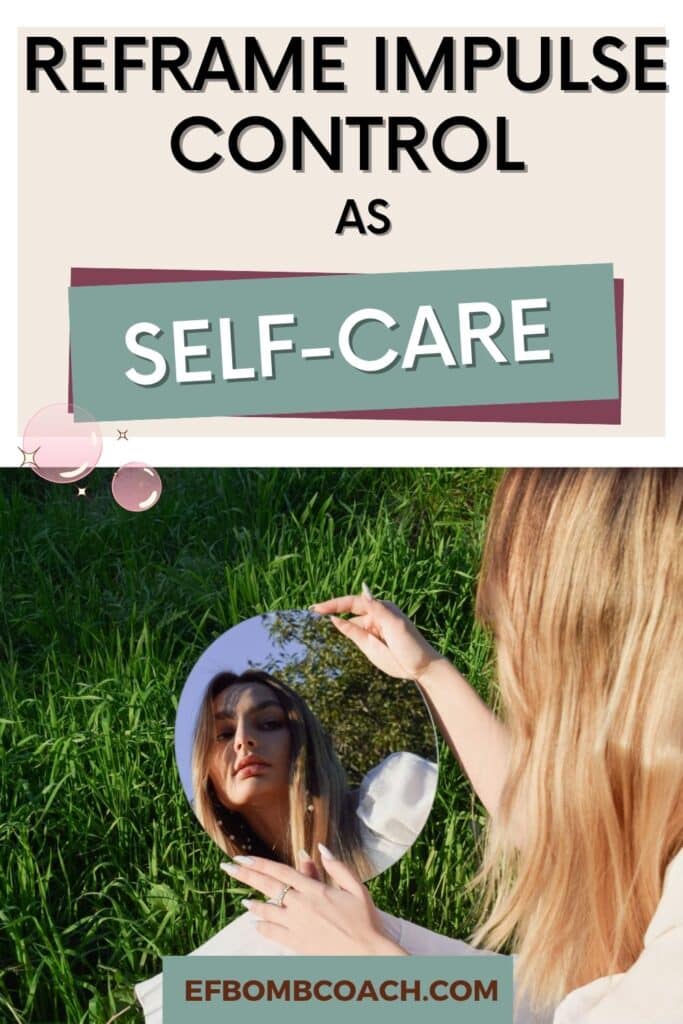Reframe Impulse Control as Self-Care: A New Mindset for Neurodivergent Women
You’ve probably been told your whole life to just “try harder” when it comes to impulse control. For many neurodivergent women, that advice comes laced with blame, shame, or guilt. You start to wonder if there’s something wrong with you or if the problem is just a lack of willpower.
Prefer to listen rather than read? Press play below.
But what if impulse control isn't about shame at all? Instead of seeing it as a test you keep failing, you can reframe impulse control as a skill that supports your well-being.
Treating impulse control as a way to care for yourself, not punish yourself, changes everything. This fresh mindset opens the door to more compassion, more understanding, and—most importantly—a life that feels less about struggle and more about self-respect.

Understanding Impulse Control and Its Emotional Weight
Neurodivergent women experience impulse control differently, and it isn’t just about having a “strong enough will.” The emotional pressure around this issue can pile up quickly, especially when mixed with society’s high expectations. Let’s explore how impulse control actually works and why it often carries so much emotional baggage.
The Science and Psychology of Impulse Control
Impulse control is more than telling yourself “no.” For neurodivergent brains, it’s about how signals move between thought, feeling, and action—sometimes at speeds or patterns that don’t match those of others.
Instead of thinking about impulse control as a fixed trait, look at it as a process shaped by how your brain works. If you have ADHD, autism, or other forms of neurodivergence, your brain might handle dopamine and executive function differently.
This means decisions, urges, and self-stopping can look inconsistent, not because you’re lazy or careless, but because your neural wiring is simply playing by different rules.
Here’s what stands out about impulse control in neurodivergent people:
- Your brain isn’t broken. It’s wired to respond to stimuli in ways that neurotypical brains don’t always understand.
- Emotions and impulses are often stronger, faster, or harder to filter. Picture trying to hold back a rushing river with your bare hands—it’s about flow, not failure.
- Consistency is a moving target. Good days can shift into hard days without warning, making “willpower” a poor explanation for what you experience.
You’ll often find that society tries to paint impulsivity as a personal flaw, but new research and real-world experiences highlight that these differences are rooted in neurobiology, not weakness.

Want to learn more about executive functioning? Take my FREE course.
Societal Pressures and Internalized Shame
Most neurodivergent women grow up under a microscope. You’re expected to manage your impulses “like everyone else,” and when you wobble, people blame you. The truth? Society isn’t set up to understand or support brains that step outside the lines.
All of this can make you internalize the message that your impulses are shameful. It’s a lonely spot—feeling like you’re constantly “too much” or “not enough” for the world around you.
But here’s some relief: moving away from shame is possible. You can start to see your impulses as signals. By gently pushing back against the idea that impulse control is a moral test, you open up space to show yourself kindness and care.
By shifting your lens from “what’s wrong with me?” to “what does my brain need?” you begin to treat your impulses—and yourself—with genuine self-care.

Reframe Impulse Control: Moving From Shame to Self-Care
Neurodivergent women often hear a simple story about impulse challenges: it’s all about willpower, and if you struggle, you’re at fault. That story is not only incomplete—it’s harmful.
Shifting your mindset away from shame and toward self-care isn’t just feel-good talk. You stop punishing yourself and start understanding what you actually need.
Recognizing Impulse Struggles as Needs
Nobody chooses to wrestle with impulsive decisions or emotional outbursts. These aren’t proof you’re broken or lacking discipline.
They’re signals—your brain and body are trying to get your attention. Treating impulse struggles as clues to unmet needs changes everything.
Think about it: If you wince every time you can’t resist a craving or interrupt someone mid-sentence, shame piles up. You start believing you’re not disciplined enough or just “too much.” But what if, instead, you asked what your brain or body was missing in those moments? Often, you’ll find:
- Hunger, exhaustion, or boredom are driving the urge.
- Overstimulation or anxiety is making it hard to pause and reflect.
- Unmet emotional needs—like wanting connection, excitement, or relief—show up as impulsive actions.
Blaming yourself feeds self-criticism, which only ramps up stress and spirals into more impulsivity. Research shows that chronic shame isn’t just emotionally painful. It can chip away at confidence, motivation, and even physical health over time.
When you start to see your struggles with impulse control as legitimate, understandable needs, you open a new path forward: one where curiosity, not criticism, drives your growth.

Did you know I have a membership for women who want to improve their executive function skills? Check it out here.
The Self-Care Approach: Compassion Over Criticism
Self-care is more than bubble baths and spa days. For neurodivergent women, self-care starts in your mindset. It means treating yourself with the same kindness you’d offer a struggling friend—not because you deserve pity, but because compassion creates real, lasting change.
Compassion isn’t letting yourself off the hook. It’s giving your brain the conditions it needs to function at its best. When you replace self-criticism with empathy and care, you build up resilience and make change possible. Here’s what compassion in action looks like:
- Recognize your limits and needs sooner. If you’re feeling the urge to splurge or snap, pause and check in. Did you eat? Did you rest? Are you overwhelmed? Simple self-awareness offers a chance to meet your needs before they become urgent.
- Use gentle self-talk. Swap “Why can’t I control myself?” with “What’s making this so hard right now?” That shift alone can lower stress on the spot.
- Break the problem into small pieces. If holding back an impulse is tough, see if you can wait for two minutes or change your environment rather than expecting overnight perfection.
- Ask for help when you need it. Self-care means knowing when to reach out, not muscling through alone.
Studies show that practicing self-compassion builds motivation and accountability much more than self-criticism does. Developing a routine that supports you rather than punishes you has long-lasting effects on your mental health and self-image.
You can’t guilt yourself into better impulse control. But you can learn to tune in, answer your needs, and show up for yourself in new ways.
You don’t have to keep fighting yourself or wearing shame as a second skin. When you treat impulse control as self-care, you open the door to more freedom and less pressure.
This change isn’t about being perfect or hiding your struggles. It’s about noticing what you need, honoring how your brain works, and choosing kinder habits on purpose.
Over time, this softer approach builds real strength. You start to trust your choices, stand up to old shame, and see progress you can feel proud of. Every step you take is a choice for yourself. That’s where real empowerment grows.









